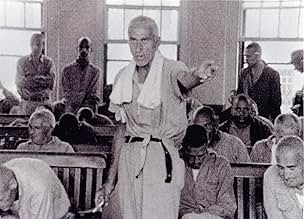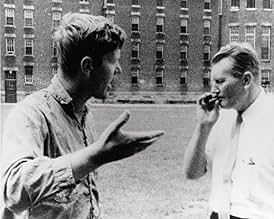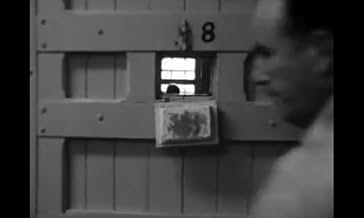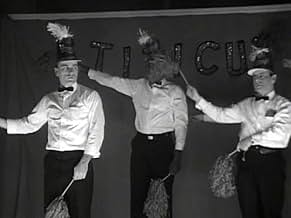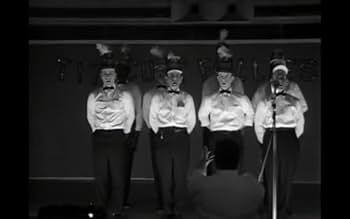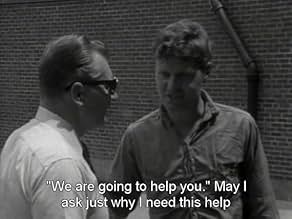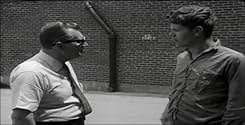Uno sguardo all'interno del Massachusetts Correctional Institution Bridgewater, dove le persone rimangono intrappolate nella loro follia.Uno sguardo all'interno del Massachusetts Correctional Institution Bridgewater, dove le persone rimangono intrappolate nella loro follia.Uno sguardo all'interno del Massachusetts Correctional Institution Bridgewater, dove le persone rimangono intrappolate nella loro follia.
- Regia
- Sceneggiatura
- Premi
- 6 vittorie totali
Recensioni in evidenza
TITICUT FOLLIES is a very shocking film, I would only recommend it with caution to others.
Wiseman is oft said to be of the leading proponents of cinéma verité. His films have no narration, music or titles. He simply observes his subjects with cool, clinical detachment. Whatever Wiseman records, the viewer is left to interpret for themselves. Nothing is explained.
Along with Emile de Antonio, Wiseman is one of the godfathers of documentary cinema. Throughout his career, he'd established the standard for what is now known as "observational" or "objective" documentary film-making. Unfortunately, this tag obfuscates the many symbolic, didactic and "engineered contrasts" found in Wiseman's films. Wiseman's films aren't strictly "objective". They have points to make, and are never free of his subjective biases.
Unlike many documentary filmmakers, Wiseman's films all focus on institutions. His subjects are whole organisations, and he typically generates "drama" by simply observing the various cogs and people at work within these societal machines. High schools, welfare offices, zoos, hospitals, ballet groups, army basic training camps, small towns, ICBM bases and business corporations are just some of the institutions he's tackled.
With "Titicut Follies", Wiseman goes behind the walls of a Massachusetts Mental Institution and exposes the treatment of inmates by guards and social workers. The footage he shoots is both macabre and revolting. The mental institution pretends to be a place of logic and the scientific method, but Wiseman reveals it to be a place of chaos and absurdity. Patients are deemed "mentally unsound" simply for not conforming to the institution's absurd standards. They're routinely teased and bullied, and left to roam the corridors completely naked. One articulate patient attempts to get his doctor to explain why he's being imprisoned, but the doctor has no answer.
Several inmates, one a socialist and the other an intelligent Russian, seem to be in the institution for political reasons. Both are of sound mind, but because they sympathise with the communist cause and distrust American's involvement in Vietnam, they've been labelled paranoid schizophrenics and jailed indefinitely.
The hardest scene to watch is of a forced feeding. A doctor smokes a cigarette as he inserts a long rubber tube into a patient's nostril and pours soup into a funnel. Halfway into the procedure, the doctor's cigarette falls into the funnel. In a surprisingly heavy handed directorial intrusion, Wiseman inter-cuts this painful scene with glimpses of the patient's corpse being prepared for burial.
Frederick Wiseman is a curious case in cinema. You can arguably group modernist "brain" cinema into two categories: left brain artists and right brain artists. Left brain artists (Antonioni, Kubrick, Bresson, Haneke etc) are very rare. They're logical, sequential, rational, analytical, objective and look at things in terms of parts, units or sections.
Right brain artists are more common. They're intuitive, holistic, synthesising, subjective and look at wholes. They like randomness and communities. Altman, John Sayles, Spike Lee, Fassbinder, Wenders, Malle, Fellini and Lynch are good examples.
Wiseman's form is very much like a Stanley Kubrick film. He sees his subjects in terms of sections and parts. In terms of machines and larger constructs. His camera is always distant, detached and objective. One can see echoes of "Full Metal Jacket" in Wiseman's "Basic Training" and "2001" in "Zoo".
But behind this is an artist who seems to embrace improvisation and chaos. Wiseman works fast with a single camera and a simple microphone. He catches what he can, without purpose and plan, sculpting his films entirely in the moment. This lends his films, when viewed together, a strange feel. You get the sense of large social constructs, giant institutions and sprawling communities, machine like in their workings and routines, and yet within these machines, Wiseman captures fleeting glimpses of humanity, spontaneous and wild.
8/10 – This is a nightmarish little film. It's not as great as some of Wiseman's later flicks, but it is perhaps his most influential. To this day it remains the only movie in U.S. history to be banned for reasons other than obscenity or national security. Director Milos Foreman would screen "Titicut Follies" for his crew prior to making "One Flew Over The Cuckoo's Nest" and Paddy Chayevsky would base "The Hospital" on Wiseman's "Hospital". Makes a good companion-piece to Wiseman's "Near Death".
When I saw this movie in 1972, I considered myself very lucky, since I was from Massachusetts, where it was banned, and saw it only because it was shown in my Psych class in college in New York State. We had a special showing for our class and (literally) were told not to eat before seeing the film.
There was quite a bit of controversy over it, and over Bridgewater in Massachusetts back then, somehow I just assumed that the film would be available and not banned by now. The ban only protected the state of Massachusetts, really, from being portrayed as a government that ran an prison for the criminally insane where people only went in, and never came out, where prisoners were mistreated, and where the craziest person in the place was the warden. Bridgewater was used as a threat to people at the Charles Street Jail to keep in line, it was considered like a death sentence. Massachusetts probably wasn't alone, I've heard that Napa was used as a threat to people in San Quentin back then as well.
How strange about it still being restricted, I hadn't thought of it in a long time and was actually researching hunger strikes when it crossed my mind. I wonder how Bridgewater in the '60s compares to anything now.
I know a man who was there. He's a beautiful and wonderful man who was tortured there as a small child. There was nothing wrong with him. He never knew a childhood of love and nurturing, only pain and suffering. He is one of many, "Normal" people who suffered at the hands of these doctor's at this horrific hospital.
When and if you decide to watch this please keep in mind that what is filmed is only a small portion of the real horrors of which man kind is capable of. Then think how you too can help people see the truth behind many of the wrongs still happening today.
It is hard to view this film and watch the dehumanization and brutalization of these patients. They are shown naked being provoked into angry outbursts by the guards, force-fed, locked in solitary confinement naked with a metal bucket for a toilet and hundreds of other indignities. Even the fact that the film-makers had such access is a shocking violation since patients committed involuntarily are unable to give informed consent.
But this was made in 1967 before modern anti-psychotic medications were developed. As a Clinical Social Worker who has worked extensively with the chronic mentally ill over the last decade, I was shocked to see how primitive the treatment methods were, even though I was prepared by my research in graduate school. Tranquilizers were being prescribed to mitigate the symptoms of paranoia, the psychiatric interviews with patients included lots of leading questions and they were treated rudely and dismissively even when the patients were making some good points about their commitments.
It was obvious that the staff and volunteers were just doing the best they could, but I have less sympathy for the Hungarian psychiatrist who at times seemed as disturbed as his patients. The volunteers running games and parties and shows reminded me of the Friendly Visitors to the Poor, those well-intentioned 19th C. socialites who volunteered to sing hymns and read the Christian bible to poor people in the tenements to "improve" their lives.
All in all, this is a very worthwhile film and highly recommended to professionals and interested others in the mental health field. Yes, there are some definite ethical problems in the way this was created, but as a historical record it is invaluable. I give this 9/10.
Lo sapevi?
- QuizAlong with Superstar: The Karen Carpenter Story (1987), which is illegal due to copyright issues, this is the only American film banned from release for reasons other than obscenity or national security. 'Titicut Follies' was filmed inside the Massachusetts Correctional Institution at Bridgewater, a prison hospital for the criminally insane. After the Commonwealth of Massachusetts sued the filmmakers, the Massachusetts Supreme Judicial Court ruled that the film constituted an invasion of inmate privacy and ordered the withdrawal of the film from circulation.
- Citazioni
Patient: How did the first Great War start? Because of a demand by the Austrian Hungary Dynasty for the execution of an accomplice who already was sentenced to life imprisonment in, um, in Serbia. Yet they demanded a prosecution for execution for Austria-Hungary laws! What does that mean? They wanted execution! The war was fought over execution! The same execution that is going on in Vietnam; over making an execution over these natives of Vietnam. They're not Vietcong, they're not communists. Whatever the American Government doesn't like, they use the - they foist on this term "communist". Because I speak the way I do, you gonna call me a communist? I'm not a communist! Even though, I have communist affiliations. Communist really means Community-ist. That's what we are if you want to call us communists because we are FOR our community. We like the well-standards. We're for the people. And that's what they call these uh... what do they call? these people that talk about a new matter... Agitators! We agitate... do we start these troubles? I'm a communist because I expound my views about the world conditions? It's the duty of every citizen to expound his views or her views of what goes on in the world. If more of them expounded their views about the conditions in the world, less chaotic conditions would exist. And the nuclear war is gonna happen not because - not what i say, not what all these war-mungers or peace-mungers blab about because all throughout the ages you will find: every time a new weapon was put out they say its the end of war. They said the submarine was the end of war, what happened? The gas masks put an end to war. What happened? They got masks. What about these submarines that are supposed to control the seas? What happened? They got airplanes that drop def-charges. You look through the ages and you find new weapon is put out, somebody puts out a counter-weapon. But the nuclear weapon doesn't stop because people are stock-piling. Anybody who starts stock-piling weapons eventually uses them! They get tired of stock-piling them and they use them. They're just like kids. They figure they got toys to play with, they're gonna play with those toys!
- Curiosità sui creditiRe-release: 'The Supreme Judicial Court of Massachusetts has ordered that "A brief explanation shall be included in the film that changes and improvements have taken place at Massachusetts Correctional Institution Bridgewater since 1966".
- ConnessioniFeatured in What Is Cinema? (2013)
I più visti
- How long is Titicut Follies?Powered by Alexa
Dettagli
- Data di uscita
- Paese di origine
- Sito ufficiale
- Lingua
- Celebre anche come
- Безумцы Титиката
- Luoghi delle riprese
- Azienda produttrice
- Vedi altri crediti dell’azienda su IMDbPro
- Tempo di esecuzione1 ora 24 minuti
- Colore
- Mix di suoni
- Proporzioni
- 1.37 : 1

